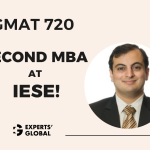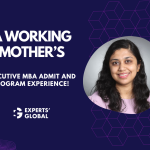Experts’ Global: Hi Ayush, how are you doing?
Ayush: Hi Aanchal, I’m good. How are you?
Experts’ Global: I’m doing very well. So, thank you for taking out some time, basically, this conversation is about helping the future aspirants to have a lot of information, from your experience and the schools that you applied to and eventually got admitted in. Okay?
Ayush: Yeah.
Experts’ Global: So, I will start by asking can you first elaborate on your results, Ayush?
Ayush: Sure. So, I got admits from UCLA, Anderson, in DU, and INSEAD, and a waitlist at a couple of schools. I think I applied to about seven or eight odd schools, and I got through like five of them.
Experts’ Global: Okay, and which school are you eventually attending?
Ayush: So, I will attend INSEAD. INSEAD has been my dream school, for quite some time.
Experts’ Global: Okay, okay. So, also elaborate a little on your background, for the viewers to understand better.
Ayush: I’m an engineer from the Delhi College of Engineering, and given that I am an engineer, a relatively common profile, I had a very diverse work experience, like I worked in a bank, MNC bank, in the strategy division. In my most recent role, I was working at one of India’s biggest start-ups, working in the risk analytics team. I had a GMAT of 740 and I am 26. So, that’s a little bit about my profile.
Experts’ Global: Fair enough. So, what do you think are those few things that you did right to get such amazing results?
Ayush: Okay, so I feel firstly that I had done a lot of research when I was in my application phase, and I knew, very clearly, what are the things I really want. What are the things, you know, the schools that I should really look at, and this really enabled me to prioritize the time that I gave to different aspects of the application to different schools. It just helped me really structure my entire first step. Also, throughout this entire phase, I had a lot of perseverance, I had a lot of discipline, I kept talking to a lot of people here and there. Even while I was deciding on the kind of, the schools that I wanted to apply to, I had done a lot of research there, spoken to multiple alumni, from here and there, and I just kept trying to motivate myself, throughout that entire process. You know, keep going for the entire process.
Experts’ Global: So, sometimes students also have this challenge of working in a full-time job and managing the hectic application process and GMAT preparation. So, what are the few pointers that you have for them that can help them achieve those?
Ayush: So, I think its most of the time you are actually doing the full-time work, with your MBA applications and it’s just so essential to manage your time really well. You have to be on top of your game for the entire, 10-12 months, whatever you are looking at in your entire application phase. There has to be good research. The work that you actually do that has to be really effective. It’s not just about putting in four or five hours every day, it’s really so much about productive work and as much about planning your entire journey. So, some of the tips that I would actually say you know like share with some of the applicants would be that its best to get the GMAT out of the way, as early as possible. There needs to be adequate time between GMAT and, you know, your application process when you are looking schools or writing your essays, or preparing your applications, or preparing for interviews.
A lot of times, people focus much more on the quantitative aspect, since for GMAT it would be like the first step and not enough time on the qualitative aspect. It’s a lot of hard work preparing your applications for all of these schools. You should probably speak to a couple of people from any school that you actually apply to. You need to know so much about these schools that you are applying to. Also, I feel that it should also be that when you’re working on your applications or your cases, there needs to be a lot of focus on what is your investment. It’s not about figuring out what are the things that I should write and what are the things that I should not write; it’s as much a self-introspection journey, where you actually figure out, “What is it that I bring to the MBA school?” “What is my USP?”, and I think that that is one aspect of your application that every candidate should spend a lot of time on, self-introspection.
Experts’ Global: Fair enough, fair enough, some very good points Ayush. SO, how was your interview experience with INSEAD, If you can elaborate on that?
Ayush: Okay, my interview experience with INSEAD was amazing. I had two sets of alumni interviews; they generally tend to pair you with one alum, who’s actually from a similar background as yours and generally tends to be one who has 20 odd years of work experience after an MBA, a pretty senior guy. So, I mean, the day of the interview really arrived, when I had scheduled interviews with both of these alumni, the first one was at Starbucks, at a coffee shop, and I was pretty nervous, to be honest, initially, but my first interview at Starbucks was more conversational. Although the interviewer made it a point to make me really comfortable before the interview, he ordered me a coffee, he told me “It’s just a chat, let’s discuss a bit about your work, about what you want to do in the future.” We ended up talking for almost two hours, where we kept talking about analytics in today’s time, the future of analytics, what do I hope to gain from an MBA, what to actually do after an MBA. What I really feel was that he was essentially trying to see if my entire application and what I was saying in the interview was concurrent. The story ought to be continuous and I felt that in the first interview that was essentially what he was checking. For the second interview, even though the first one went really well and it was a big confidence boost for me, the second one was with a very senior INSEAD alum, and I was actually more nervous there because I was going to the office of an MNC company, sitting in the board room, waiting for my interviewer to actually come and, eventually, what I found was that even that interview was very conversational. He was checking my knowledge about my current role, about the companies that I would look at, after my MBA. I mean, how I was actually looking at financing my MBA; he wanted to see if I actually planned my entire journey really well, and he gave me a lot of tips as well when it was about my post-MBA experience that we were actually talking about. He gave me a lot of tips and a lot of pointers there. Also, I would say that he focused a lot on one perspective, one specific question that was “Why do you want to do an MBA?”, and that took almost like a 15-20 minute discussion where I was trying to talk to him about why essentially, I need an MBA and that was probably the most important question.
Experts’ Global: Right, right.
Ayush: Once he was convinced that I had a need for an MBA, it ended up being very conversational.
Experts’ Global: Okay, thank you. So, what would you like to say about your experience or learning, in managing application timelines?
Ayush: Okay, so, I think it was a great learning experience. We tend to get very bogged down when we are thinking of applying and seeing like a pile of work, but essentially it’s a great learning experience because, you know, I got a chance to work on my communication skills, I got a chance to work on my writing skills, I got a chance to actually do a lot of self-introspection, which generally, we do not tend to do. I think the very plan, where I kept talking to all of these admissions officers, the interview that was over a meal, I think even all that was a great learning experience for me. Also, one big thing that you can actually learn from this entire application process as you mentioned previously that most of us are actually working when we’re applying for all these MBA programs, so we end up learning a lot of time management, and I think that’s just so essential for the MBA, where you just get to learn how to prioritize, how to handle your time. Essentially, you only have 24 hours in a day, and it’s really overwhelming going through that entire journey, so it has to be very well managed when you think about your time. I think that’s something that I’ve really been able to work on in my application process.
Experts’ Global: Great, great.
Experts’ Global: So, how would you describe your experience working with Experts’ Global?
Ayush: My experience with Experts’ Global was amazing. I think the first point here would be that, you know, they really helped me structure my entire application process. It’s been very structured; there were timelines; there were reminders everywhere. It essentially helped me really prioritize my work. I think it was very effective and smart work. It’s not about putting in five hours every day, it’s about working really smartly, and the way Experts’ Global helped me structure my entire application process that is probably the best thing about Experts’ Global.
The second thing is that my applications mentor kept providing me a lot of guidance, she was always available to take calls, she really helped motivate me throughout the entire process. I mean, it’s essentially very overwhelming when you go through the entire process and the team at Experts’ Global really helped me motivate me to keep working hard towards my applications.
Experts’ Global: Thank you, thank you so much for your time, Ayush.







